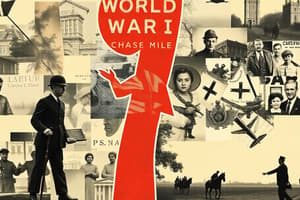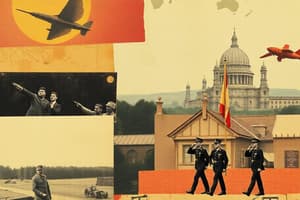Podcast
Questions and Answers
What was a direct consequence of the assassination of Archduke Franz Ferdinand?
What was a direct consequence of the assassination of Archduke Franz Ferdinand?
- It led to the immediate signing of a peace treaty.
- It prompted Britain to withdraw from its alliances.
- It caused Austria-Hungary to declare war on Serbia. (correct)
- It resulted in the dissolution of the Triple Alliance.
Which factor contributed to heightened tensions among nations prior to WW1?
Which factor contributed to heightened tensions among nations prior to WW1?
- The increase in military expenditure. (correct)
- The promotion of international trade.
- The establishment of the United Nations.
- Universal disarmament agreements.
How did alliances play a significant role in the escalation of WW1?
How did alliances play a significant role in the escalation of WW1?
- They focused solely on economic cooperation.
- They divided Europe into factions, leading to larger conflicts. (correct)
- They encouraged nations to disband their armies.
- They created a balance of power that prevented conflict.
What was a significant aspect of nationalism in the context of WW1?
What was a significant aspect of nationalism in the context of WW1?
What was one of the key failures in diplomacy that contributed to the onset of WW1?
What was one of the key failures in diplomacy that contributed to the onset of WW1?
Flashcards are hidden until you start studying
Study Notes
Causes of WW1
-
Militarism
- Increased military expenditure and arms race among European nations.
- The growth of large standing armies and naval forces, particularly in Germany and Britain.
-
Alliances
- Complex system of alliances divided Europe into two main factions:
- The Triple Entente: France, Russia, and Britain.
- The Triple Alliance: Germany, Austria-Hungary, and Italy.
- Alliances intended for protection led to larger conflicts when rival alliances were drawn in.
- Complex system of alliances divided Europe into two main factions:
-
Imperialism
- Competition for colonies and resources led to tensions, particularly in Africa and Asia.
- Economic rivalries heightened distrust among nations.
-
Nationalism
- Rise of national pride and the desire for independence among ethnic groups.
- Particularly notable in the Balkans, where Slavic nationalism threatened Austria-Hungary.
-
Assassination of Archduke Franz Ferdinand
- The immediate spark that ignited the war; Ferdinand was assassinated on June 28, 1914, in Sarajevo.
- The assassination by a Bosnian Serb nationalist led Austria-Hungary to issue an ultimatum to Serbia.
-
Diplomatic Failures
- Ineffective diplomacy and miscommunication escalated tensions.
- Nations were quick to mobilize and enter war without exploring diplomatic solutions.
-
Crisis and Escalation
- The July Crisis of 1914 involved a series of diplomatic and military decisions that culminated in the declaration of war.
- The interlinked alliances meant that a conflict between two countries quickly involved many others.
-
Long-standing Rivalries
- Historical enmities, such as France's desire for revenge against Germany after the Franco-Prussian War (1870-1871).
- Economic and territorial disputes that existed prior to the war further exacerbated tensions.
Militarism
- European nations greatly increased military spending and built up their armies and navies, particularly Germany and Britain.
- This arms race fueled tensions as each nation aimed to outdo the others in military power.
Alliances
- Complex alliances divided Europe into two main blocs: the Triple Entente (France, Russia, and Britain) and the Triple Alliance (Germany, Austria-Hungary, and Italy).
- These alliances, intended for protection, escalated conflicts quickly as nations were obligated to come to the aid of their allies.
Imperialism
- European powers competed for colonies and resources, primarily in Africa and Asia, leading to tensions.
- Economic rivalries intensified mistrust among nations, as they sought to control valuable markets and resources.
Nationalism
- National pride and the desire for independence surged among ethnic groups.
- Slavic nationalism in the Balkans threatened Austria-Hungary's control over its diverse empire.
Assassination of Archduke Franz Ferdinand
- This event triggered the outbreak of war. Archduke Franz Ferdinand, heir to the Austro-Hungarian throne, was assassinated in Sarajevo on June 28, 1914.
- The assassin, a Bosnian Serb nationalist, aimed to weaken Austria-Hungary's control over Serbia.
Diplomatic Failures
- Diplomacy proved ineffective and miscommunication exacerbated tensions.
- Nations were quick to mobilize for war, neglecting to explore alternative peaceful solutions.
Crisis and Escalation
- The July Crisis of 1914 involved a series of decisions that led to war.
- The interlinked alliances meant that a conflict between two nations quickly involved many others, escalating into a global war.
Long-Standing Rivalries
- Historical enmities, like France's desire for revenge against Germany for the Franco-Prussian War (1870-1871) fueled tensions.
- Pre-existing economic and territorial disputes intensified the climate of distrust and animosity.
Studying That Suits You
Use AI to generate personalized quizzes and flashcards to suit your learning preferences.



